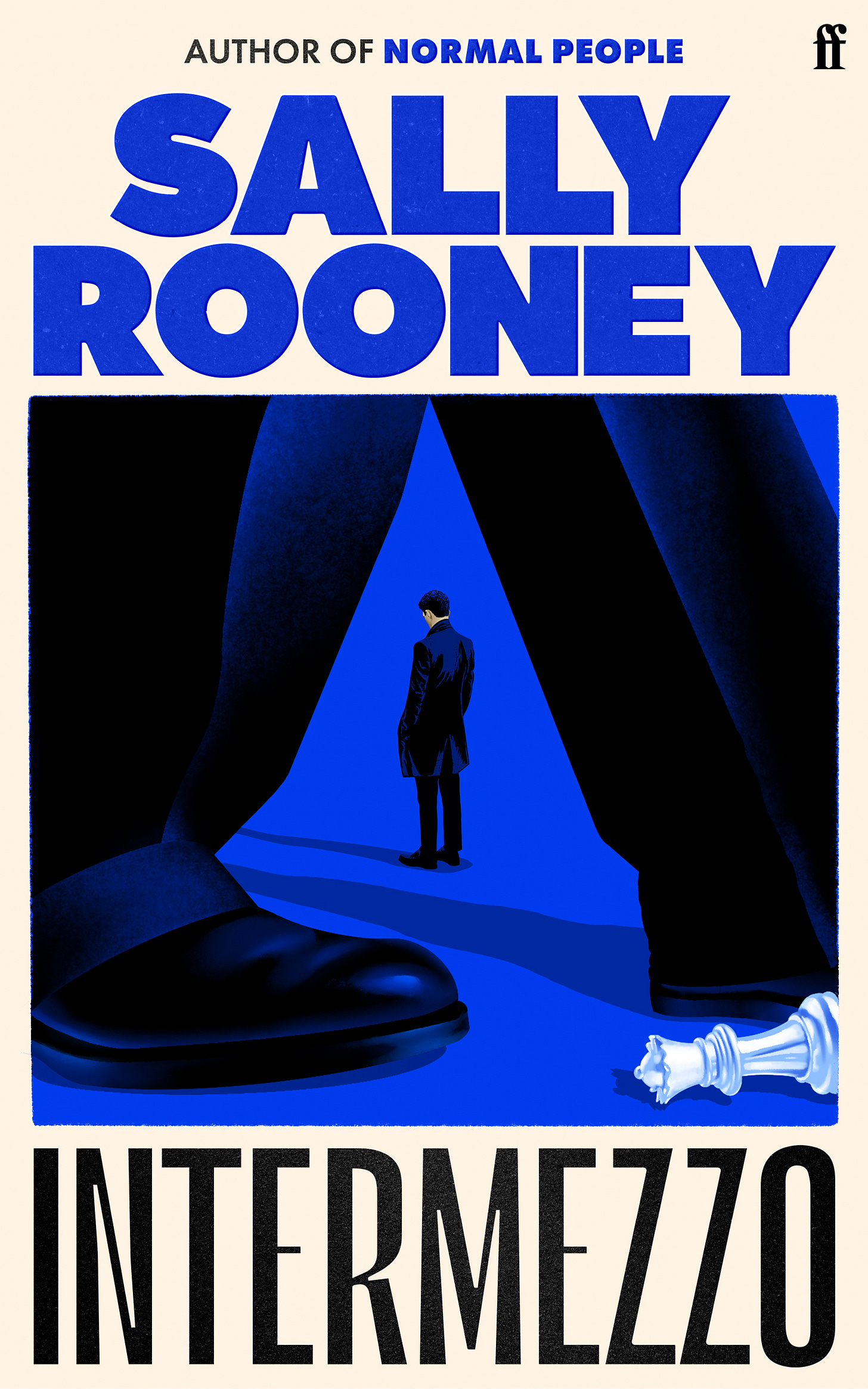On the commercialisation of Sally Rooney
Can you have your (hyperrealistic Intermezzo book cover) cake and eat it?
Sally Rooney’s highly anticipated fourth novel, Intermezzo, hit the shelves this week. Excited readers queued up outside bookshops to get their hands on a fresh hardback copy, and maybe even some merchandise.
On release day, my Instagram feed was saturated with readers and booksellers showcasing their Intermezzo bookmarks, tote bags, coffee cups, gift bags, and, in one instance, a hyperrealistic cake in the form of the book.
Without wanting to ruin the fun for everyone else, I couldn’t help but feel that the agglomeration of publicity, merchandise, and general buzz about the book on social media had become overbearing.
For clarification purposes, I am a big fan of Sally Rooney’s work. I loved Normal People and Conversations with Friends. They were very special and important to me when I read them, and I think they are beautifully written, well-crafted novels guided by Rooney’s steady hand on language and highly perceptive eye for human interactions and relationships. I admit I struggled with Beautiful World Where Are You and didn't actually finish it, but that isn’t really the point of this post.
In the months preceding release day, advanced reader copies (ARCs) of Intermezzo were popping up on my Instagram feed as more and more lucky readers were gifted shiny, blue copies to promote the book launch. The dissemination of these ARCs enforced a certain exclusivity around the novel, reinforcing the divide between the haves and the have-nots, between the ones lucky enough to be chosen for an ARC and the ones who are left watching and waiting.
Sally Rooney has talked about her socialist values and her aversion to being in the public eye. I’m not sure how the large quantity of merchandise and heavy marketing campaigns line up with this position.
In an interview in 2019, Rooney said,
“I’m very sceptical of the way in which books are marketed as commodities, almost like accessories which people can fill their homes with, like beautiful items that you can fill your shelves with and therefore become a sort of ‘book person’. The reason that I feel sceptical of all that is because it makes me feel that books have no potential to speak truth to power, they have no potential as political texts because of the role they play in the culture economy that’s already predetermined how people are going to read them. So even if the book is filled with Marxist propaganda, it’s still sealed off from any real political potential because of its position as a commodity in this market.”
I wonder if people feel compelled to buy Intermezzo to be perceived as a ‘book person’.
Rooney’s personal perspective on the commodification of books reveals an irony in the abundance of merch surrounding Intermezzo. Fans are paying for merchandise associated with an author who probably wouldn’t participate in this sort of capitalist performance herself.
One could argue that it doesn't really matter what Sally Rooney would do or say or think about the commodification of her novel, because readers are allowed to be excited about a book without having to consider the author’s personal opinions on marketing. And if we separate the art from the artist, then whatever Sally Rooney’s opinions are on Intermezzo coffee cups don’t matter.
But what I’m struggling with here is that her opinions do matter. Because the Intermezzo release is just as much about Rooney as it is about the novel. It was heralded ‘Sally Rooney Day’ by booksellers and bookstagrammers alike, so she can’t be extracted from it. I wonder if the Irish novelist herself has become a commodification, which in a way belittles what she really has to say and, in her own words, undermines the ‘political power’ of her writing.
It seems the commodification of the author, and the book, and the marketing, and the merchandise all begin to form one entity screaming ‘buy me now!’, and I can’t help but feel that Sally Rooney herself would feel conflicted by that.
I don’t want to be overly negative. It’s great that people can line up outside a bookshop, meet new friends, form a community of readers, and get their hands on a beautiful new book. And I’m not entirely against the idea of merchandise - who doesn't like a cute tote bag? I’ve certainly got plenty of them. I just find the obsession and hype over merchandise, marketing, and aesthetics feels a little performative and over the top.
The frenzy surrounding Intermezzo has become a spectacle on social media, which is simultaneously enchanting and repulsive. I don’t feel able to participate in this spectacle because I haven’t read the book, so I can’t say how I feel about it yet.
But for others this is not a problem. People are either raving about a book they haven’t even read or raving about a book that was gifted to them by the publisher. And I’m not sure an ARC recipient would dare to rate Intermezzo anything less than five stars for fear of being perceived as unintellectual, which makes the aforementioned hype surrounding the novel even more performative and inauthentic.
If you don’t like Intermezzo, you’re just not smart enough, cool enough, relatable enough, interesting enough, etc etc, so we carry around our Intermezzo totes without having to read Intermezzo itself, because the bag is enough to convey the idea that we are well-read book people.
The commercialisation of Intermezzo and ‘Sally Rooney’ as a name and a symbol pushes an economic divide between the haves and the have-nots. Those who have the coffee cups are part of the discourse, which is to say part of the intellectual hub of ‘cool girls’, whilst those who do not receive the ARCs, those who do not eagerly engage with capitalist marketing, are watching from afar, fenced off from the cultured clique.
This leads me to questioning what Intermezzo has come to signify. Is Intermezzo a novel, a piece of literature that people are actually reading and absorbing and being moved by? Or is Intermezzo an object of status and cultural capital, a thing which signifies to others that those in possession of it are the cool ones?
We can turn to the renowned sociologist, Jean Baudrillard, in order to unpack this idea of Intermezzo as a symbolic object a little more.
In The System of Objects (1968), Baudrillard discusses the relationships between people and objects. He is particularly concerned with objects and “the processes whereby people relate to them and with the systems of human behaviour and relationships that result therefrom.” He argues that relationships between people and objects are changing in an age of post-industrialisation and consumerism.
He posits that when objects are commercialised, they enter into a cultural system. In addition, when an object acquires value, it is often the ‘idea’ of an object that is being consumed rather than the object itself.
If we apply Baudrillard’s thinking to the response to the launch of Intermezzo, we can see that the ‘idea’ of Intermezzo as a cultural symbol is being consumed before the contents of the book are even being read.
To go further, Baudrillard writes that “the mere fact that a particular object has belonged to a famous or powerful individual may confer value on it”. And whilst the copies of Intermezzo piled high in a bookshop do not ‘belong’ to Rooney, they are associated with her by nature of being written by her. So this association with a famous writer makes Intermezzo more valuable and therefore more profitable not just economically but also culturally.
An example of economic and cultural value as a result of Rooney association would be the Intermezzo book ‘premiere’, launched by Belletrist (an online book club founded by actress, Emma Roberts) and FSG. This bookish premiere, held at the Irish Arts Centre in New York, included food, drinks, a bracelet-making workshop, and even a DJ set. Of course, there was also merch. According to this Vogue article, “as well as their bracelets and Majestic Photobooth memories, guests took home enamel pins, pencils, Post-Its, a scarf, and a tote.” The amount of ‘stuff’ here feels superfluous, and far removed from the heart of the premiere: a novel.
Despite the abundance of merch and activities, something the event lacked was Rooney herself. The extravagance of merchandise, and the fact that Rooney wasn’t even there, makes this premiere seem disconnected from its origins. But the association with Rooney’s name (as well as the presence of Emma Roberts) made the event valuable and profitable both economically and culturally.
Meanwhile at her book launch in London, the day after the book was released to the public, Rooney took the opportunity to speak out against the war in Gaza. Speaking at the Southbank Centre on Wednesday, Rooney said,
“Countless heritage sites, museums, libraries, schools and mosques, as well as art venues and cultural centres, much like this one, have been irretrievably destroyed.”
In this broader context, celebrity premieres filled with merchandise feel overly superfluous. If Intermezzo has lost any potential as a political text - as Rooney feared when she warned against books as commodities - the 33 year old novelist has used her voice to speak out against conflict and for political protest.
This post was an exploration of the commercialisation of Intermezzo and the irony of Rooney’s personal discomfort with that sort of thing.
It seems to me that Intermezzo and Sally Rooney’s name have become commodified so that book publishers can make economic profit and book influencers can culturally benefit from the ‘cool girl’ connotations of Rooneyism.
With all of this being said, I am looking forward to reading Intermezzo, but I think I will pick up a copy when it arrives in my library or at least when the frenzy has slowed down.









![Sally Rooney Collection 4 Books Set (Beautiful World Where Are You [Hardcover], Normal People, Conversations with Friends, Mr Salary): Amazon.co.uk: Sally Rooney: 9789124145460: Books Sally Rooney Collection 4 Books Set (Beautiful World Where Are You [Hardcover], Normal People, Conversations with Friends, Mr Salary): Amazon.co.uk: Sally Rooney: 9789124145460: Books](https://substackcdn.com/image/fetch/$s_!r07q!,w_1456,c_limit,f_auto,q_auto:good,fl_progressive:steep/https%3A%2F%2Fsubstack-post-media.s3.amazonaws.com%2Fpublic%2Fimages%2F5fb54a9a-0a9b-4e30-ac5b-fbdd9de9999b_648x1000.jpeg)
Ah Amy what a delight to read this, this is so thoughtful and nuanced and I agree with everything you wrote! I felt the same about the exclusive holographic Murakami book covers that were doing the rounds a few months ago - it is a sad paradox when publishers and influencers commodity books so much that it actually puts them in conflict with the themes of the books themselves and the whole point of reading - to feel connected to others... It's sad that this way of life and 'influencing' has become so much the norm that it's now the default.
What a thoughtful, well written essay. I’m a big fan of her work but I have to agree that the Sally Rooney frenzy is a bit over the top at the moment. What I wonder is how much control an author has over how their book is marketed. Did she have a say in all the merch and premiers?